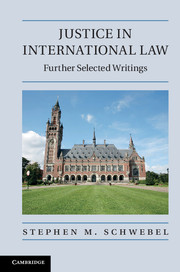Book contents
- Frontmatter
- Contents
- PART I International Court of Justice
- PART II International arbitration
- 12 A BIT about ICSID
- 13 The influence of bilateral investment treaties on customary international law
- 14 The United States 2004 Model Bilateral Investment Treaty: an exercise in the regressive development of international law
- 15 The United States 2004 Model Bilateral Investment Treaty and denial of justice in international law
- 16 Anti-suit injunctions in international arbitration: an overview
- 17 The law applicable in international arbitration: application of public international law
- 18 The validity of an arbitral award rendered by a truncated tribunal
- 19 The authority of a truncated tribunal
- 20 Injunction of arbitral proceedings and truncation of the tribunal
- 21 Public policy and arbitral procedure
- 22 The creation and operation of an International Court of Arbitral Awards
- 23 The Kingdom of Saudi Arabia and Aramco arbitrate the Onassis Agreement
- 24 The Southern Bluefin Tuna case
- 25 A celebration of the United Nations New York Convention on the Recognition and Enforcement of Foreign Arbitral Awards
- 26 Does the consent of the Contracting Parties govern the requirement of an “investment” as specified in Article 25 of the ICSID Convention?
- PART III Miscellaneous
- Collected publications, judicial opinions and book reviews
- Index
24 - The Southern Bluefin Tuna case
from PART II - International arbitration
Published online by Cambridge University Press: 07 September 2011
- Frontmatter
- Contents
- PART I International Court of Justice
- PART II International arbitration
- 12 A BIT about ICSID
- 13 The influence of bilateral investment treaties on customary international law
- 14 The United States 2004 Model Bilateral Investment Treaty: an exercise in the regressive development of international law
- 15 The United States 2004 Model Bilateral Investment Treaty and denial of justice in international law
- 16 Anti-suit injunctions in international arbitration: an overview
- 17 The law applicable in international arbitration: application of public international law
- 18 The validity of an arbitral award rendered by a truncated tribunal
- 19 The authority of a truncated tribunal
- 20 Injunction of arbitral proceedings and truncation of the tribunal
- 21 Public policy and arbitral procedure
- 22 The creation and operation of an International Court of Arbitral Awards
- 23 The Kingdom of Saudi Arabia and Aramco arbitrate the Onassis Agreement
- 24 The Southern Bluefin Tuna case
- 25 A celebration of the United Nations New York Convention on the Recognition and Enforcement of Foreign Arbitral Awards
- 26 Does the consent of the Contracting Parties govern the requirement of an “investment” as specified in Article 25 of the ICSID Convention?
- PART III Miscellaneous
- Collected publications, judicial opinions and book reviews
- Index
Summary
The award of the arbitral tribunal in the Southern Bluefin Tuna case relates to two principal themes of Judge Oda's professional life: third-party settlement of disputes, and the law of the sea. Judge Oda's attainments in the latter sphere are renowned. His attainments as a judge of the ICJ are no less acknowledged, but merit this comment from a former colleague. Judge Oda's work at the Court has been distinguished by its industry, its insight and its independence. Judge Oda masters the file; no detail escapes him. He probes, he thinks, and he sees points that others sometimes have not. He thinks for himself, and says what he thinks, fearlessly and independently. That has been repeatedly demonstrated in the work of the Court of the last quarter century. As a friend of Judge Oda for some fifty years, and a Court colleague for nineteen years, it is a privilege and pleasure to join in contributing to a Festschrift in his honor.
The Southern Bluefin Tuna case is of high interest in several respects. It was rendered by the first arbitral tribunal constituted pursuant to Annex VII of the Third United Nations Convention on the Law of the Sea (UNCLOS). It confronted issues of considerable complexity and significance. The parties – Australia and New Zealand versus Japan – are States whose contributions to international law and life are outstanding. They were represented by counsel of extraordinary skill; their arguments were a pleasure to read and hear.
- Type
- Chapter
- Information
- Justice in International LawFurther Selected Writings, pp. 270 - 275Publisher: Cambridge University PressPrint publication year: 2011



